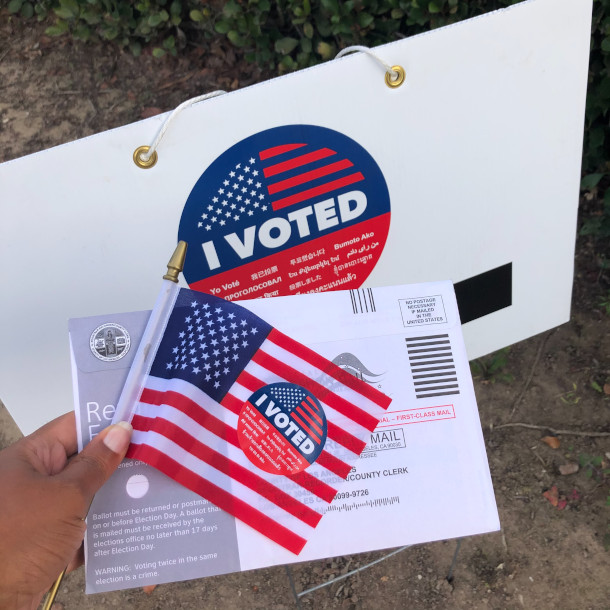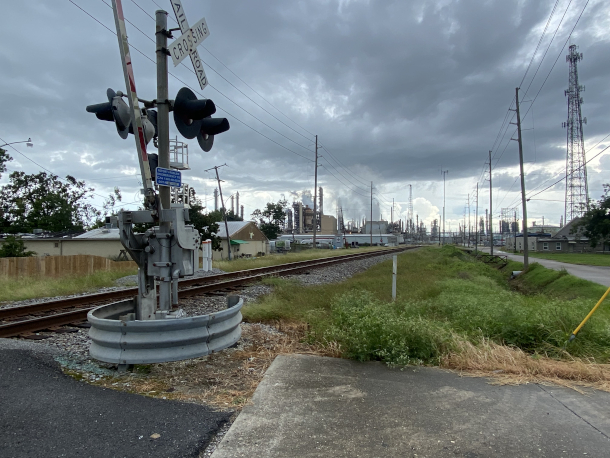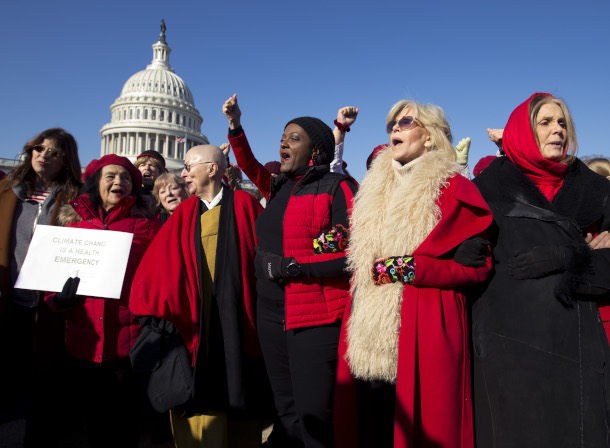Finding Climate Hope in the Black Vote
Air Date: Week of June 21, 2024

Black and Brown people are more likely than any other demographic to vote on environmental issues, according to a study conducted by the Yale Program on Climate Change Communication. (Photo: Janine Robinson, Unsplash, Fair Use)
Heather McTeer Toney and Host Steve Curwood continue their conversation about her book Before the Streetlights Come On: Black America’s Urgent Call for Climate Solutions and talk about how faith, voting, and community engagement can help address the climate emergency.
Transcript
CURWOOD: It’s Living on Earth, I’m Steve Curwood.
I’m back now with Heather McTeer Toney, a former EPA regional administrator, now with Beyond Petrochemicals and author of the book Before the Streetlights Come On: Black America’s Urgent Call for Climate Solutions.
CURWOOD: What can we learn from the 2022 midterm elections about the power of the black community when it does come to voting, especially with environmental issues? That year in Georgia, for example, research showed that a considerable number of people of color came out to vote, even people who hadn't voted before and they had a very strong connection to concerns about the environment. In fact, some surveys show that black and brown people are among the most concerned of registered voters about the environment.
MCTEER: Absolutely.
CURWOOD: So, what about voting as a solution to the problem of environmental injustice?
MCTEER: Absolutely. That was a Yale study that showed black and brown people are more likely than any other demographic to vote on environmental issues. It's also the demographic that's the most attacked, because over the past three years, the number of pieces of legislation that have attempted to be passed through in states where they have limited who can vote, how they can vote, and where they can vote, is targeted specifically to the demographic of people that will turn out to vote the most for environmental issues. Which is why I tell everyone at the end of every single one of my chapters, make sure you vote do everything that you can vote, it is one of the most powerful levers that we have to be able to speak to how environmental policy is shaped and putting the right people in office to shape that policy.

Petrochemical plants near residential neighborhoods in “Cancer Alley” along the lower Mississippi River in Louisiana. (Photo: Courtesy of Deep South Center for Environmental Justice)
CURWOOD: Towards the end of your book, you have some fascinating numbers, you say that about 75% of African Americans say that religion is an important part of their lives, compared to less than half of whites and maybe a bit more for Latinos, even 40%, among younger Black people. And the large environmental movement in this country is fairly agnostic. I'm not sure that I've been to a major environmental advocacy gathering where people have stopped to pray in advance. Now, we know that social movements in this country had been led, I think the civil rights movement, of course, coming out of the churches. There's a Reverend in front of Martin Luther King Jr's name. How can the connection be made to really engage the Black community, those who are church going to take on this whole question of the climate emergency, the toxics emergency and bring their strength to the table? Because I only see them in little bits and pieces right now?
MCTEER: Yeah, it is the sleeping giant, it really is. And I think it's gonna take us seeing environmental action, climate action, and civil rights action, because you're absolutely right in the civil rights movement was so staunchly led by the community of faith. It's hard to not connect Earth and nature to your responsibilities for being a Christian.
CURWOOD: You mean caring for creation. So, what can be done to change that? You call it a sleeping giant, what can be done to wake up the sleeping giant?

Heather McTeer Toney alongside other environmental activists including Jane Fonda during a Fire Drill Friday Climate Strike in Washington D.C. (Photo: Courtesy of Jose Luis Magana for Moms Clean Air Force)
MCTEER: I think it is encouraging and giving space and freedom to do it. Green the Church is growing every single day. Interfaith Power and Light, an organization that has been infusing faith and climate action, and now we're beginning to see it on the right, so much that there's like evangelicals for the environment. We're coming to this place of having to have climate hope and if there's any entity on this planet, that brings hope is the faith-based community. And faith-based community regardless of faith, we think about our Muslim brothers and sisters, Christians, Jews, Hindus, there's always this element of faith that speaks to the hope of tomorrow. Climate issues have been framed as such an existential crisis that is so big, people feel hopeless, they don't they don't see a path out of it. Faith requires the hope of us every single day living our lives and that there is a hope for future generations, a hope in tomorrow, and that we have a responsibility and connectivity to that. So, I think the more that we say that, the more that we bring to bear our responsibilities from spaces of hope and do that in a way that is open, it is fearless and it is connected to science, the more people feel comfortable, and we're able to talk about some of those solutions.
CURWOOD: Heather McTeer Tony is executive of Beyond Petrochemicals and author of the book Before the Streetlights Come On: Black America's Urgent Call for Climate Solutions. Thanks so much, Heather, for taking the time with us today.
MCTEER: Thank you.
Links
The Atlantic | “Louisiana Chemical Plants are Thriving off of Slavery”
Living on Earth wants to hear from you!
Living on Earth
62 Calef Highway, Suite 212
Lee, NH 03861
Telephone: 617-287-4121
E-mail: comments@loe.org
Newsletter [Click here]
Donate to Living on Earth!
Living on Earth is an independent media program and relies entirely on contributions from listeners and institutions supporting public service. Please donate now to preserve an independent environmental voice.
NewsletterLiving on Earth offers a weekly delivery of the show's rundown to your mailbox. Sign up for our newsletter today!
 Sailors For The Sea: Be the change you want to sea.
Sailors For The Sea: Be the change you want to sea.
 The Grantham Foundation for the Protection of the Environment: Committed to protecting and improving the health of the global environment.
The Grantham Foundation for the Protection of the Environment: Committed to protecting and improving the health of the global environment.
 Contribute to Living on Earth and receive, as our gift to you, an archival print of one of Mark Seth Lender's extraordinary wildlife photographs. Follow the link to see Mark's current collection of photographs.
Contribute to Living on Earth and receive, as our gift to you, an archival print of one of Mark Seth Lender's extraordinary wildlife photographs. Follow the link to see Mark's current collection of photographs.
 Buy a signed copy of Mark Seth Lender's book Smeagull the Seagull & support Living on Earth
Buy a signed copy of Mark Seth Lender's book Smeagull the Seagull & support Living on Earth

